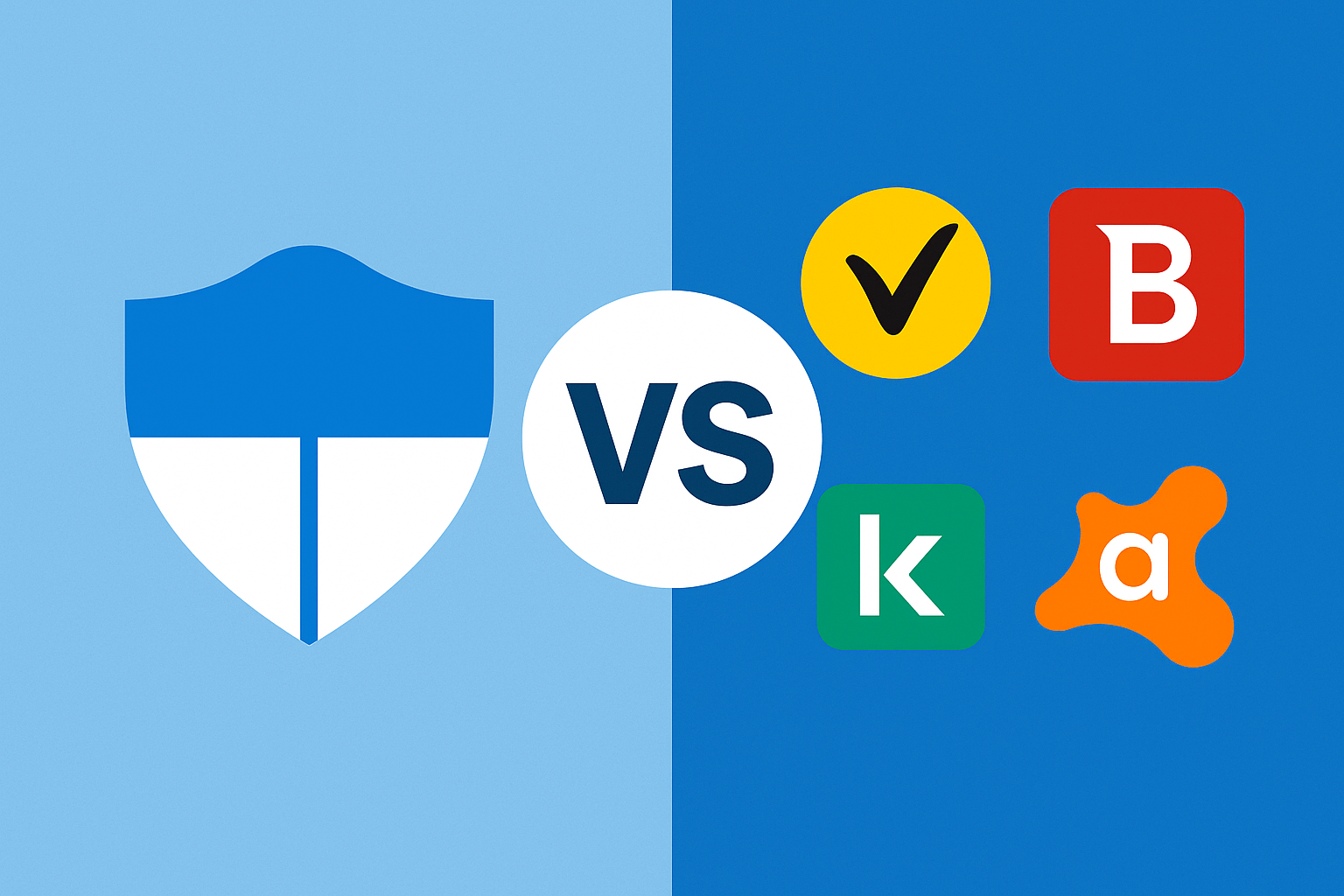Windows Defender vs Third-Party Security: Which Is Better?
Introduction
When it comes to protecting your computer from viruses, malware, and online threats, one common debate stands out: Windows Defender vs third-party security. Windows Defender, now known as Microsoft Defender Antivirus, comes preinstalled on Windows devices and offers built-in protection. On the other hand, third-party security solutions from brands like Norton, Bitdefender, or Kaspersky promise enhanced features and stronger defenses.
But which is the better choice for your system? To help you decide, this guide compares Windows Defender and third-party security software in terms of performance, features, cost, and ease of use.
The Basics of Windows Defender
Windows Defender is Microsoft’s free, built-in antivirus solution. It is designed to provide real-time protection against malware, spyware, ransomware, and other common threats. Since it comes preloaded with Windows, users do not need to install or pay for additional software.
Pros of Windows Defender
- Free and Built-In: No extra cost and no downloads required.
- Automatic Updates: Receives security updates directly from Microsoft.
- Minimal System Impact: Runs quietly in the background with little effect on performance.
- Integrated with Windows: Works seamlessly with the operating system for convenience.
Cons of Windows Defender
- Limited Features: Lacks advanced tools such as VPNs, password managers, and identity theft protection.
- Average Detection Rates: While effective, it may not catch every sophisticated or zero-day attack.
- Basic Ransomware Protection: Offers some safeguards but less advanced than third-party tools.
The Strengths of Third-Party Security Software
Third-party security providers have built reputations for offering advanced, all-in-one solutions that go beyond basic antivirus protection.
Pros of Third-Party Security
- Stronger Threat Detection: Many third-party tools score higher in independent lab tests for malware detection.
- Advanced Features: Often include firewalls, VPNs, parental controls, dark web monitoring, and more.
- Cross-Platform Protection: Extend security to macOS, Android, and iOS devices.
- Customizable Options: Users can choose specific plans and security levels to match their needs.
Cons of Third-Party Security
- Cost: Most premium security suites require a yearly subscription.
- System Performance Impact: Some antivirus programs consume more memory and CPU.
- Potential Bloatware: Certain providers include unnecessary extras that slow down devices.
Performance Comparison: Speed and Efficiency
When comparing Windows Defender vs third-party security, performance is a crucial factor. Windows Defender is lightweight and optimized for Windows, which means it rarely slows down your system.
Third-party software, while often more powerful, may cause noticeable slowdowns during full system scans or updates. However, many premium options have improved efficiency in recent years to balance security and performance.
Protection Capabilities
Windows Defender provides reliable day-to-day protection against malware, phishing, and ransomware. However, third-party software generally offers stronger protection against new, evolving threats. Independent testing labs consistently show that top third-party solutions detect more threats than Defender.
Additionally, third-party tools often include extra layers of defense such as sandboxing suspicious files, advanced firewalls, and exploit prevention. These features help prevent cybercriminals from finding vulnerabilities in your system.
Features Beyond Antivirus
The debate of Windows Defender vs third-party security often comes down to features. Defender covers the basics, but most users who require more than malware protection turn to third-party tools.
- Windows Defender: Core antivirus, firewall, parental controls, and some ransomware protection.
- Third-Party Security: Features may include VPN, encrypted storage, password management, system cleanup, dark web monitoring, and identity protection.
For users who handle sensitive information, shop online frequently, or work remotely, these extra features provide significant value.
Ease of Use and Compatibility
Windows Defender is simple and user-friendly since it is integrated into the Windows Security app. There is no setup required, making it perfect for casual users.
Third-party software varies in ease of use. Some offer intuitive dashboards and automation, while others require manual configuration. However, many third-party options are compatible with multiple devices and operating systems, making them ideal for users with diverse tech needs.
Cost Considerations
One of the biggest advantages of Windows Defender is that it is free. For users who only need basic protection, this makes it an excellent option.
Third-party security, on the other hand, comes with a cost. Plans usually range from $30 to $100 per year, depending on the number of devices and included features. For households or businesses with multiple devices, these costs can add up.
Which One Should You Choose?
The choice between Windows Defender vs third-party security depends on your needs:
- Choose Windows Defender if:
- You want a free, built-in solution with minimal system impact.
- You use your device mainly for browsing, streaming, and everyday tasks.
- You prefer simple protection without extra features.
- Choose Third-Party Security if:
- You handle sensitive data such as online banking or business files.
- You want advanced features like VPNs, parental controls, and identity theft protection.
- You use multiple devices across different platforms.
Conclusion
When comparing Windows Defender vs third-party security, there is no one-size-fits-all answer. Windows Defender is reliable, lightweight, and cost-free, making it ideal for casual users. However, third-party security solutions provide stronger protection, more features, and broader compatibility, which may be essential for advanced users or businesses.
Ultimately, the best choice comes down to balancing your security needs, budget, and device usage. Whether you stick with Windows Defender or invest in third-party software, ensuring your system stays protected should always be the priority.




Comments are closed